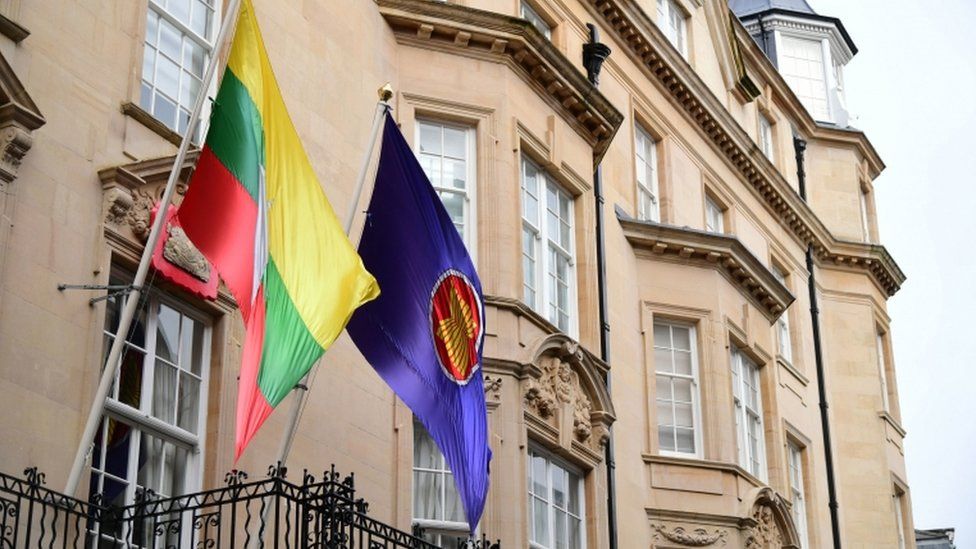Myanmar coup: Envoy to UK recalled after pro-Suu Kyi remarks
 image copyrightPA Media
image copyrightPA MediaMyanmar has recalled its ambassador to the UK after he spoke out against a military coup and demanded the release of deposed leader Aung San Suu Kyi.
Kyaw Zwar Minn had told the BBC that the country was already "divided" and could be at risk of civil war.
Myanmar's military seized power in a 1 February coup claiming there was voter fraud in a recent election.
Ms Suu Kyi's party the National League for Democracy (NLD) had won a landslide victory in the polls.
International observers have disputed the military's claims of election fraud and said they did not observe any irregularities.
Key leaders of the government were arrested. Ms Suu Kyi is being held in an undisclosed location and faces several charges including causing "fear and alarm" and illegally importing walkie talkies.
What did the ambassador say?
The ambassador, who is a former military colonel, had on Monday issued a statement calling for the release of Ms Suu Kyi and ousted president Win Myint.
He was praised by British foreign minister Dominic Raab, who commended his "courage and patriotism".
In a subsequent interview with BBC Burmese, Mr Kyaw Zwar Minn had said he decided to issue the statement after seeing increasing casualties at protests.
"I don't want to see citizens of Myanmar dying. I am arguing for all [protesters and military] to stop," he said. "The country is already so divided and at risk of possible civil war. I want peace."
He also reiterated his call for Ms Suu Kyi's release, and appeared to stand firmly by her.
"Ms Suu Kyi appointed me and I will take her orders," he said. "I demand for her and President U Win Myint to be released. The solution is not in New York or London, it is in [Myanmar capital] Nay Pyi Taw."
He maintained that his latest remarks were not "betraying the country", adding that he was standing on "middle" ground.
During the interview Kyaw Zwar Minn, who has represented Myanmar in London since 2013, said he did not have plans to defect or get asylum in the UK. He added that the Burmese embassy in the UK had no direct communication with the military.
The Myanmar government later issued a statement saying he was recalled. His current plans are not known.
Last week, Myanmar's embassy in Washington also issued a statement condemning the deaths of civilians protesting the coup, and called on authorities to "fully exercise utmost restraint".
What's the context to all this?
Myanmar's military seized power after overthrowing the government and declared a state of emergency.
Just days later, the civil disobedience movement began to emerge - professionals who are refusing to return to work in protest.
The movement quickly started to gain momentum and it was not long before hundreds of thousands of people began taking part in street protests.
But there has been an escalation of violence between police officers and civilians in recent days - at least 54 people have died in the protests so far.

Myanmar in profile
- Myanmar, also known as Burma, became independent from Britain in 1948. For much of its modern history it has been under military rule
- Restrictions began loosening from 2010 onwards, leading to free elections in 2015 and the installation of a government led by veteran opposition leader Aung San Suu Kyi the following year
- In 2017, Myanmar's army responded to attacks on police by Rohingya militants with a deadly crackdown, driving more than half a million Rohingya Muslims across the border into Bangladesh in what the UN later called a "textbook example of ethnic cleansing"



No comments